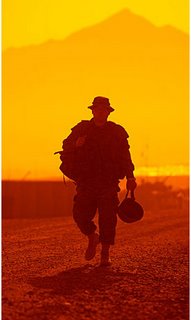One of the drawbacks, if you can call it that, of having studied at a military college is that when soldiers are deployed on a combat mission overseas and news start coming back that some of them have fallen, you start to expect that one day you will come upon a name that is familiar. With respect to the situation in Afghanistan—where following yesterday’s suicide bombing 36 Canadian soldiers and one diplomat have been killed—I have not yet, thankfully, had such an encounter (I do personally know, however, a few Americans who were seriously injured in Iraq).
 According to Canada’s Fallen: Understanding Canadian Military Deaths in Afghanistan, a report released yesterday by the Canadian Centre for Policy Alternatives, Canadian soldiers in Afghanistan are three times more likely to be killed than British or other forces deployed there and—get this—six times more likely to be killed than US soldiers in Iraq. Apart from the US, no other country has suffered more military casualties in Afghanistan than Canada. Since February, the report continues, 43 percent (that figure is probably higher now, as the report does not include yesterday’s attack) of non-US casualties in the country were Canadian. Based on these trends, the report concludes with the extrapolation that by the time Canada’s NATO mission in Afghanistan winds down in January 2009, another 108 of its soldiers will have been killed. That number could be higher, or lower, contingent on the vagaries of insurgencies, which by nature are hard to predict and make forecasts on.
According to Canada’s Fallen: Understanding Canadian Military Deaths in Afghanistan, a report released yesterday by the Canadian Centre for Policy Alternatives, Canadian soldiers in Afghanistan are three times more likely to be killed than British or other forces deployed there and—get this—six times more likely to be killed than US soldiers in Iraq. Apart from the US, no other country has suffered more military casualties in Afghanistan than Canada. Since February, the report continues, 43 percent (that figure is probably higher now, as the report does not include yesterday’s attack) of non-US casualties in the country were Canadian. Based on these trends, the report concludes with the extrapolation that by the time Canada’s NATO mission in Afghanistan winds down in January 2009, another 108 of its soldiers will have been killed. That number could be higher, or lower, contingent on the vagaries of insurgencies, which by nature are hard to predict and make forecasts on.The suicide bombing that targeted a Canadian foot patrol in Kandahar Province yesterday killed four Canadian soldiers and injured scores more. What’s even worse is that the bomber, who was riding a bicycle, detonated his bomb while children had gathered around the soldiers, who were handing out (reports conflict) books and pencils or candy. As of yesterday, two dozen children were reported injured.
Tactically, a person choosing certain death to kill a handful of foreign soldiers could make sense—though that person’s commitment to the cause, ratio notwithstanding, may seem alien to us. But for that same person to also target the children of the very country he is ostensibly trying to protect from foreign occupiers points to something else altogether. Combined with the fact that the Afghan insurgency is intensifying, it demonstrates that nearly five years after it was “liberated,” the world is failing Afghanistan, and Canada is part of that failure.
The decision to switch from reconstruction—the original mandate of the Canadian soldiers deployed there—to counterinsurgency has led to Afghanistan resembling more and more like Iraq. Clearly, the “hearts and minds” we had sought to win have slipped through our fingers; how else could we explain the Taliban’s seemingly bottomless pool of militants and the murderous tactics they have adopted to fight NATO? No wonder the British commander of NATO forces in Afghanistan said over the weekend that it would take another three to five years to end the insurgency. This assuredly cannot be seen as good news by those who had swallowed the Afghanistan “success story” line.
The change in Canada’s mandate in Afghanistan was less-than-democratically made when the Liberals were still in power and then expanded upon by the Conservatives. By doing so, Canada has become a participant in a project that without any doubt is not contributing to making Afghanistan—which is scoring record opium production levels—a better place both for its citizens and the rest of the world, which inevitably suffers the consequences of that failed state. Other trends, such as the tripling of the number of attacks against schools this year (172, according to the UN Rapporteur) and the fact that many of the tactics that insurgents have used so effectively in Iraq are increasingly being used in Afghanistan, are worrisome.
Surely, when a man riding a bicycle makes the conscious decision to blow himself up along with children of his own blood, something has been lost, and something terrible has been born to replace it.
Again, as I have done in these pages, I certainly am not arguing for the abandonment of Afghanistan, nor do I mean to imply that we should drop the fight with the Taliban and its allies. However, for the murderous insurgency to pick up steam the way it has in 2006, and for it to take the ugly shape that, as yesterday’s events highlight so bluntly, it has adopted, we clearly have been doing something wrong.
Let us just hope, for the Canadian soldiers and their families’ sake, that the report’s extrapolations were too high.

No comments:
Post a Comment